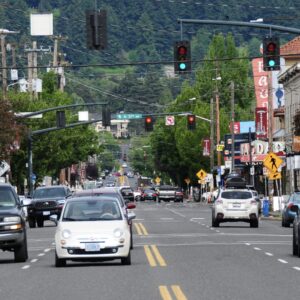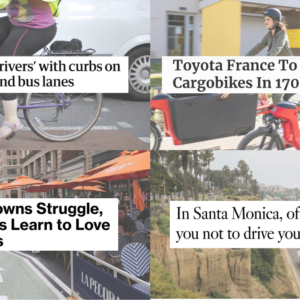
Portland’s flourishing cargo bike scene has once again made major national headlines. Over the holiday weekend, the owners of Joe Bike, B-Line Sustainable Urban Delivery, and Portland Pedal Power — all local businesses that use or sell cargo bikes — were featured in articles in the New York Times and the Wall Street Journal (the top two U.S. newspapers by circulation).
On Friday (July 5th), writer Tom Vanderbilt wrote a comprehensive story about how cargo bikes have become, “the new station wagon” in America. The story prominently mentions Joe Bike owner Joe Doebele and refers to him as the country’s largest seller of the Yuba Mundo cargo bike:
“The country’s biggest seller of the Yuba Mundo is Joe Bike, a Portland, Ore., store specializing in “high-performance urban, utility and touring bikes.” The owner, Joe Doebele, said that when he began carrying cargo bikes—a catchall term covering a variety of bike styles built for functional hauling—five years ago, he thought they would be for just that, cargo. “But parents, mostly moms, were the ones who were buying them,” he said. “It quickly became a family bike.”
Mr. Doebele attributes the interest to Portland’s “mini baby boom” and the fact that many young families are choosing to stay in cities like Portland instead of moving to the suburbs—not to mention higher gas prices.”
The following day the New York Times devoted an entire article in their Business section to two Portland businesses made possible by cargo bikes: B-Line Sustainable Urban Delivery and Portland Pedal Power. The reporter introduces readers to B-Line’s founder Franklin Jones and describes his business:
“Mr. Jones, a former teacher, founded B-Line Sustainable Urban Delivery, a company that delivers produce, baked goods, coffee beans, bike parts and office supplies to restaurants, bike shops and other businesses throughout Portland’s downtown area using electric-assisted tricycles that pull 60-cubic-foot cargo boxes with a 600-pound capacity.
B-Line is the latest example of the greening of a traditional industry. The company’s cargo boxes are comparable in size to a small commercial van, but, unlike vans, the trikes don’t emit carbon dioxide or cause traffic jams at delivery stops. Mr. Jones estimates that B-Line has completed more than 30,000 deliveries that otherwise would have been made by gasoline-chugging vehicles.”
Portland has long been a leader in the use and sale of cargo bikes. Joe Bike is only one of several local shops that has found business success with cargo bikes and B-Line and Portland Pedal Power show an inspiring mix of the entrepreneurial and biking spirit our city is known for. These national headlines are a testament to the strength of these local bike businesses and another reminder of how important they are to our local — and increasingly national — economy.
Read more about cargo bikes in the BikePortland archives.





‘As the cherry on top of a delicious freeway defeat confection here at home, last week’s NYC bike bliss feels like one large step for cycling mankind in our country.’
http://rebelmetropolis.org/cycling-past-the-grave-of-the-crc/
It will be very useful having all that experience making, selling, & using utility bikes when it is no longer socially acceptable to hop in the car powered by burning ancient sunlight.
In the NYT article on B-Line, there was a quote from Office Depot (or Staples?) saying that B-Line worked out a bit more expensive per delivery for them than “traditional” methods. How can that be? It costs more to operate an electric trike than a cargo van?
I noticed that too. Perhaps this has to do with (some of) the subsidies fossil-fuel powered transportation enjoys?
Probably payroll costs.
For example:
If I have 24 manhours of labor to be done at a fixed hourly rate it is less expensive to pay 2 people to work 2 – 12 hour shifts than paying 3 people to work 3 – 8 hour shifts even accounting for the time-and-a-half for the 2 hours over a 10 hour shift as mandated by Oregon labor law.
Point being is that our tax system rewards companies that use fewer workers to do the same amount of work. All other things being equal it is reasonable to assume that a cargo bike takes more manhours to move a large amount of freight compared to a big truck.
Hey Everyone! Don’t forget that you can see other cargo bike businesses this Saturday (July 13th) at the Cascadia Cargo Bike Fair and Disaster Relief Trials. The event starts at 10 am, and it is being held at OMSI.
BTW, the Times article also briefly mentioned that you can get your plumbing done by bike, so it was nice to see a contractor reference in there. Joshua, you ‘da man!
I’ll be there blazing our cargo bike